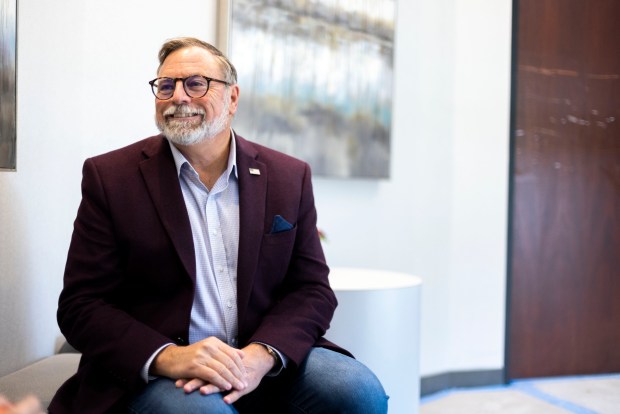A lot had to go right for Jeff Geraci to survive his heart attack.
Eight weeks ago, Geraci, 64, had just reached a personal best for rowing at a workout class when he started to feel especially tired in his car. While driving home on First Colonial Road in Virginia Beach, he had a heart attack behind the wheel. After crossing all lanes of traffic and narrowly missing a bus, Geraci crashed into a sign outside a dentist office.
Just yards away, Dr. Deepak Talreja who had arrived to work at Sentara Cardiology Specialists, heard the crash and quickly began CPR. Geraci was later transported to the hospital, where doctors told him that he had gone through “sudden cardiac death.” Talreja said Geraci had a “widow maker” blockage in the artery at the front of his heart.
If Geraci had stayed at home that morning, like he initially wanted to, he would have been alone when he had his heart attack.
If he had stayed in the parking lot at his workout class, he likely would have died in his car.
Because it was early that morning, there were few cars traveling on First Colonial Road at the time. The bus stop where Geraci crashed was empty, and the bus had not yet pulled out into the roadway. Geraci had his cruise control set, so if the sign had not been there, he likely would have crashed into a building at full speed.
Talreja, who is the chief of cardiology for Sentara Health, had forgotten the keys to his third-floor office that morning, which is why he was still in the parking lot when Geraci crashed.
Like a choreographed routine, the events leading up to that heart attack had to go perfectly right if Geraci was going to survive. Geraci said it was a “pure miracle.”
“As I understand it, the time limit for not having the oxygen to your heart, to your brain, to your liver is eight minutes,” Geraci said. “If you’re dead for eight minutes, there’s a lot of damage. I was dead for five, so I’m very blessed by the whole thing.”
Geraci lives an active lifestyle, going to workout classes, riding bikes and walking outside regularly. He also was not a heavy drinker or a smoker, and when he went to the doctor, his cholesterol levels were always good.
But a family history of cardiac arrests likely had an impact on his health. Talreja said this is not uncommon, and Geraci’s story is proof that heart disease can happen to anyone, regardless of lifestyle.
“Heart disease builds up so insidiously on the inside of the body, with oftentimes no warning, until a catastrophic event happens,” he said. “The good news is Sentara has been very forethinking. We have a really incredible CT-scanning and noninvasive imaging division for patients that want to know: ‘Am I at risk?’”
Talreja credited the entire Sentara team for saving Geraci’s life, including EMTs, nurses, medical assistants, doctors and members of the Cath Lab team.
In addition to getting tested for heart disease early, Talreja emphasized the importance of knowing CPR, as well. In the past, he has had patients who may have had a better chance of survival if someone in the vicinity had begun chest compressions earlier. Though his team may save lives all the time inside the hospital, situations like Geraci’s can be a reminder of just how important it is to know how to help someone who may be having a cardiac arrest.

“We do start to take for granted some of the things we can do to help a person get better,” Talreja said. “There’s a handful of episodes where you’re on a plane or in a situation (like Geraci’s). You’re out of your element, you’re not in the place where you have all that support, like Cath labs, x-ray machines and IVs … It feels different at some level, but life saving work happens every day in the hospitals around us, and we take so much of it for granted.”
Geraci said the work that Talreja and the team have given him a new lease on life. He and his fiancee, Ruthie Powell, are planning to marry in the next year, and the two are considering the anniversary of his heart attack as a potential wedding date. There’s still a lot of life left to live, he said.
“Now every day, I wake up, say prayers, go to the gym and spend time with Ruthie,” Geraci said. “We have a lot of fun.”
Eliza Noe, [email protected]
Originally Published:
